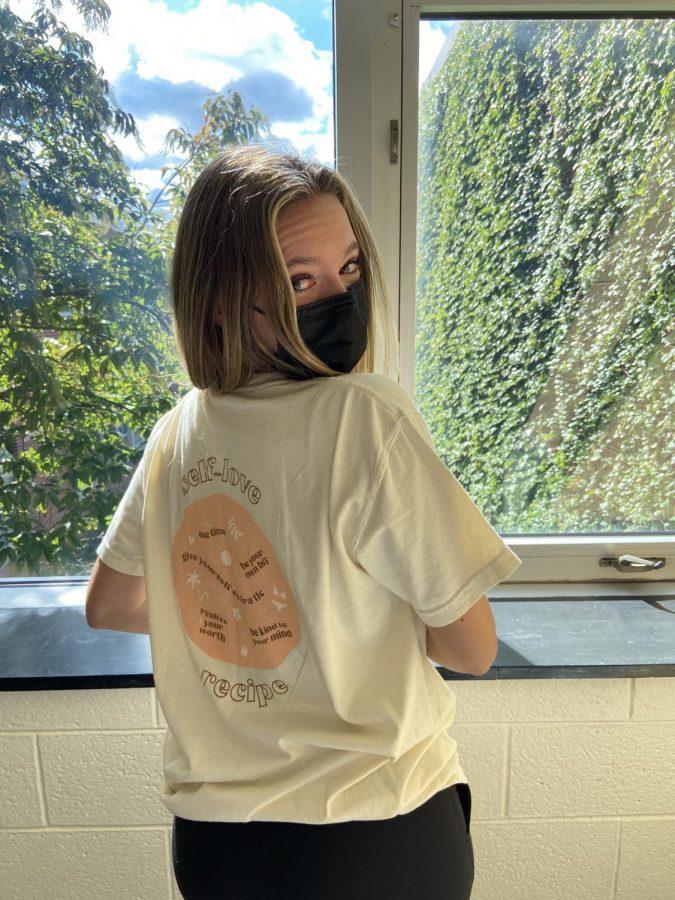Why is Self Care So Important?
Self-care and self-love promote a balanced life
October 18, 2021
Self-care is defined simply as, “the practice of taking action to preserve or improve one’s own health.” Society today fools people into thinking that self-love is unimportant and unnecessary, that taking time for oneself is of little significance. The falsehood of these notions cannot be emphasized enough, as it is simply impossible for a person to care for and love others without first loving themself.
Aspects of society such as stigmas, pressures, and a general lack of self-love lead many people to neglect their own happiness. Today, the world is actively pushing to prioritize awareness around mental health, and through that, people must also push to move away from the mindset of ignoring self-care. While it may feel unnatural at first, all people should work to incorporate some form of personal care into their everyday lives, as it is essential to leading a happy, healthy, and balanced life.
There is a certain beauty that comes with individuals being able to embrace their unique self-care practice. What’s so wonderful about the world of self-care is that there is no “right” or “wrong.” Many people share similar routines that help them reach their maximum amount of happiness, confidence, and energy. These practices decrease their feelings of depression, anxiety, and negative thoughts. While interviewing SHS English teacher Courtney Hayden, she revealed her favorite act of self-care, saying, “I take a daily walk each afternoon, especially after long days of teaching.” Breathing in the fresh air, Hayden plugs in her headphones and listens to her favorite music or podcast. Hayden works tirelessly throughout the hustle-bustle of her day, so she uses this precious time at the end of her day to decompress and clear her mind.
Similar to Hayden, SHS history and psychology teacher Andrew Roberts makes his post-work self-care a priority. Every day, Roberts sets aside time to go on a run, using this activity to ease his thoughts after a long day. While exercise is a great way to relieve stress and produce endorphins, sometimes the mind needs something more calming and less intense.
SHS senior Sarah Villa uses a simple but ever-so-effective self-care technique—journaling. Writing in a journal can be as structured or as free-flowing as one prefers. Villa tends to find herself with her nose in a journal, writing whatever comes to her mind: “This makes me feel a sense of clarity and stops my mind from racing before I head to bed for the night.”
The possibilities are endless to achieve a state of mental purity. It may be in the form of a walk, run, or journal session. One may practice yoga, meditation, reading, or talking with a loved one. Even simply prioritizing 8+ hours of sleep is an effective expression of self-care. No matter what one may choose, each is equally important solely to allow a person to feel they are the best version of themself.
One element that makes diving into self-care so difficult is this widespread belief that putting oneself first automatically labels a person as a narcissist. Villa recognizes this in herself, discussing how she often struggles to speak to herself kindly, as she subconsciously sees it as an act of self-centeredness. That being said, according to Villa, there are also many days in which she speaks to herself in a positive manner. On those days, treating herself kindly “almost makes me feel euphoric,” said Villa, reminding her of the power of that kind of mindset.
Self-care doesn’t eliminate care for others–rather, it expands it. Taking an active role in maintaining one’s needs doesn’t neglect the needs of others. In many ways, permitting oneself that alone time allows them to be more present, aware, and supportive in situations when loved ones need their support. Hayden captured this idea, as she suggested, “We can’t function and be our best self for others if we are not taking care of ourselves first. I always talk about at school how we always need to be taking care of ourselves, because if you are spreading yourself too thin and not taking care of your mental wellness, you will not be your best for anyone else.” Simply put, self-care and self-love should never be viewed as selfish practices, as they contribute to a more positive mindset, both internally and externally.
Self-care is a growing and complex practice that can be difficult for a person to internalize. It’s not easy to implement something so interpretable and new into one’s daily routine, but the more a person does it, the more intuitive it becomes. We, the writers of this article, have had our own experiences with times of self-hatred and constantly feeling lesser than. Experiencing that has allowed us to use the mechanisms of self-care as a means of improving ourselves. We have seen, first-hand, the positive effects of simply putting oneself first and loving unconditionally. We want nothing more than to share that with those around us.
So, we challenge readers to recognize how to best care for themselves and work on consistently making it a priority. This could mean journaling, daily gratitude, meditation, walking, listening to podcasts, etc., but no matter the form of self-care, the impact will be the same. It will foster a more positive relationship with oneself, with others, and a better mindset overall.
